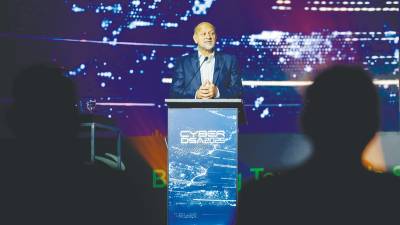KUALA LUMPUR: Malaysia must strengthen its National Critical Information Infrastructure (NCII) to safeguard daily life and business continuity in an increasingly digital world.
“As we move into a future where we depend almost entirely on digital technologies, we must ensure an ecosystem that equips us with the necessary tools to function securely,” Digital Minister Gobind Singh Deo said at the opening ceremony of the Cyber Digital Services, Defence and Security Asia Exhibition and Conference 2025 (CyberDSA 2025) today.
“If there were a cyberattack on our NCII, the consequences would be severe – we would lose access to the very information and tools needed to succeed daily,” he said.
Gobind stressed that protecting NCII is no longer optional but a national imperative, central to Malaysia’s digital ambitions. “This is what we mean when we speak about NCII,” he added. “It underpins everything, from business operations to the everyday tools people rely on.”
Gobind said trust must be redefined in the digital era, as emerging technologies reshape how people, businesses and governments connect
“In today’s world, we all speak about connectivity—4G, 5G, IoT. Over the past five years, these technologies have empowered us, transformed businesses, optimised industries and even changed how governments deliver digital services to their people.”
He pointed to ongoing showcases that highlight these breakthroughs, while underscoring that the next frontier is already here.
“Now, the conversation is about artificial intelligence – AI, generative AI and perhaps in the future, genetic AI. This is the next generation of technology, and it will continue to evolve.”
From household robots to autonomous vehicles, Gobind said, the rise of intelligent machines underscores the need for secure and resilient ecosystems – where both cyber threats and mechanical failures are addressed to ensure technology operates safely in daily lives.
“We know what technology can do, and we are ready to adopt and adapt,” said Gobind. “While we assume it is safe and expect it to benefit us, we must also recognise the national security dimensions of a virtual world that is constantly exposed to cyber threats.”
Cybersecurity Malaysia chairman of the board Al-Ishsal Ishak said together with its strategic partners under the CyberSecurity Collaboration Programme (CSM-CP), the agency supports the National Cyber Security Agency (Nacsa) in safeguarding NCII, provides trusted cybersecurity certification services, develops industry standards, and delivers capacity-building programmes that raise the bar for cyber professionals across the region.
“We remain firmly committed to capacity building. As of August 2025, CyberSecurity Malaysia has successfully trained 18,764 knowledge workers across critical domains, including digital forensics, governance, risk and compliance, incident handling and response, cryptography, and security assurance.
“Through hands-on training programmes, we truly believe that investing in human capital remains a cornerstone of our mission to build a safer and resilient digital nation,“ he said.
Al-Ishsal stated that CyberSecurity Malaysia recently spearheaded the establishment of the nation’s first vehicle forensics laboratory in advanced cybersecurity and digital forensics.
The state-of-the-art facility enhances technical capabilities in investigating road accidents, cross-border crimes and human trafficking cases.
On the international front, Al-Ishsal said, CyberSecurity Malaysia continues to strengthen regional collaboration through sustained strategic partnerships with esteemed counterparts across Asean.
These include the Cyber Security Agency of Singapore, Indonesia’s Badan Siber dan Sandi Negara, Cyber Security Brunei, Thailand’s National Cyber Security Agency, Cambodia’s Ministry of Post and Telecommunications, Ministry of Technology and Communications of Laos and the Philippines’ Department of Information and Communications Technology.
“These collaborations strengthen Asean’s ability to respond collectively to threats,“ Al-Ishsal said.
At the international level, Malaysia actively contributes to several key platforms dedicated to advancing global cybersecurity efforts.
Al-Ishsal noted that CyberSecurity Malaysia is an active member of the Forum of Incident Response and Security Teams, the Organisation of Islamic Cooperation – Computer Emergency Response Team and the Asia Pacific Computer Emergency Response Team.
“Through these multilateral engagements, we reaffirm our commitment to global best practices, technical collaboration, and the continuous exchange of expertise. These concrete commitments demonstrate that CyberDSA is not merely a forum for dialogue, but a catalyst for operational collaboration and collective resilience,“ Al-Ishsal said.
CyberDSA 2025 participants will gain actionable insights and engage with emerging technologies shaping the next frontier of cybersecurity. A lineup of 80 speakers from 15 countries will guide conferences and forums on key themes.
The three-day event, which runs until Thursday, will see more than 8,000 trade professionals from 45 countries and 150 exhibitors from 15 nations addressing the increasingly complex cybersecurity challenges shaping Asia and beyond.
